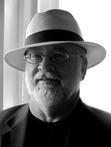Bruce DeSilva's Blog, page 55
July 22, 2011
The Word "Haboob" Angers Yahoos in Arizona
 When weathermen in Arizona started calling the region's huge, recent sandstorms haboobs, they got hate mail. People were "insulted," by the term, demanded that weathermen explain "what gave them the right" to use it, and asked: "how do you think our soldiers feel?"
When weathermen in Arizona started calling the region's huge, recent sandstorms haboobs, they got hate mail. People were "insulted," by the term, demanded that weathermen explain "what gave them the right" to use it, and asked: "how do you think our soldiers feel?"
The fact is, haboob is a perfectly good English word. It's in your dictionary. It is of Arabic origin however, and therein lies reason for the objections.
Aside from the ridiculous xenophobia this represents, it also indicates complete ignorance about how the English language works.
English is composed largely of words that were borrowed from other languages. Much of our vocabulary is of French or German origin, but English has borrowed words from virtually every language on Earth. Finnish (sauna); Tagalog (boondocks); Bantu (banjo); Mandinka (jazz); Mikmaq (caribou); Arawakan (barbecue) and so on.
And lots and lots of everyday words have been borrowed from Arabic. Off the top of my head, here are a few. Let's see if the idiots who object to "haboobs" can do without admiral, alcohol, apricot, borax, caliber, camel, candy, chemistry, cotton, elixir, garble, ghoul, guitar, jar, julep, lemon, magazine, mask, massage, mattress, nadir, orange, pajamas, racquet, safari, scarlet, sofa, sugar, syrup, tariff, tuna, and zero.
In fact, the very concept of zero originated with Arabic mathematicians. Perhaps the yahoos would like to ban it from our arithmetic.








July 20, 2011
Now Look Who's Reading "Rogue Island." It's The Creator or Rambo!
 David Morrell is the author of "First Blood," the novel that first introduced us to a guy named Rambo. He's also the author of 32 literary crime thrillers, the most recent of which is "The Naked Edge." I've had the chance to chat with him at a couple of writers' conferences, including Thrillerfest in Manhatan early this year. He's a very nice guy with a lot of insights about the craft of writing.
David Morrell is the author of "First Blood," the novel that first introduced us to a guy named Rambo. He's also the author of 32 literary crime thrillers, the most recent of which is "The Naked Edge." I've had the chance to chat with him at a couple of writers' conferences, including Thrillerfest in Manhatan early this year. He's a very nice guy with a lot of insights about the craft of writing.
Rogue Island is available in a new trade paperback as well as for the Kindle. You can buy it here. It is also available as an audiobook from Audible that you can buy here.








July 18, 2011
Look Who's Reading "Rogue Island" Now! It's Thriller Writer John Gilstrap
 New York Times best-selling thriller writer John Gilstrap, whose latest book is called "Threat Warning," takes a break from his own work to dip into my Edgar Award-winning crime novel, Rogue Island. Thanks so much, John.
New York Times best-selling thriller writer John Gilstrap, whose latest book is called "Threat Warning," takes a break from his own work to dip into my Edgar Award-winning crime novel, Rogue Island. Thanks so much, John.
Rogue Island is now available in a trade paperback edition (the hardcover is now in very short supply) and can also be purchased for the Kindle. You can buy it here. It is also available in a downloadable audio version from Audible that can be purchased here.








July 16, 2011
Look Who's Reading "Rogue Island" Now! Erica Spindler and J.T. Ellison
 Erica Spindler, a New York Times best-selling author, and J.T. Ellison, aka Thrillerchick, the author of the popular Taylor Jackson series, with my Edgar Award-winning crime novel, Rogue Island.
Erica Spindler, a New York Times best-selling author, and J.T. Ellison, aka Thrillerchick, the author of the popular Taylor Jackson series, with my Edgar Award-winning crime novel, Rogue Island.
The book is now available in trade Paperback, but the hardcover is now in short supply. It is also available for the Kindle and in a downloadable audio edition from Audio. You can find it here.








July 13, 2011
Look Who's Reading "Rogue Island" Now! It's Thriller Writer D.P. Lyle.
 That's D.P. Lyle, the prize-winning author of the Dub Walker medical thrillers, with the new, trade paperback edition of my Edgar Award-winning crime novel, Rogue Island. The book also available for Kindle and as a downloadable audio book from audible.
That's D.P. Lyle, the prize-winning author of the Dub Walker medical thrillers, with the new, trade paperback edition of my Edgar Award-winning crime novel, Rogue Island. The book also available for Kindle and as a downloadable audio book from audible.
You can buy it here.








July 12, 2011
Writing a Hard-Boild Crime Novel, an 80-Year-Old Form, and Making It Fresh and Contemporary
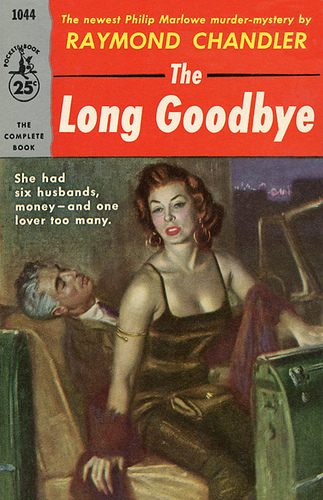 Ever since I read a paperback copy of Raymond Chandler's The Long Goodbye about fifty years ago, I have loved hard-boiled crime novels; but when I finally sat down to write my first one, I confronted a problem:
Ever since I read a paperback copy of Raymond Chandler's The Long Goodbye about fifty years ago, I have loved hard-boiled crime novels; but when I finally sat down to write my first one, I confronted a problem:
How could I write in a form that has been around for eighty years and still produce a book that would feel contemporary?
Back in 1968, I had sat in a darkened dormitory rec room with fellow college students to watch a screening of "The Maltese Falcon." Within minutes, most of us were chuckling, and by the third scene the chuckles were replaced by belly laughs.
The dialogue in John Houston's 1941 masterpiece was so cliched, and the characters were such stereotypes: the cynical detective who worked both sides of the law, the spunky but loyal secretary, the trench-coat draped gunman who talked out of the side of his mouth, the femme fatale who manipulated men with the promise of sex.
We reacted as if we were watching a parody like the one Carl Reiner directed when he poked fun at the genre in his 1982 movie, "Dead Men Don't Wear Plaid," with Steve Martin in the lead role.
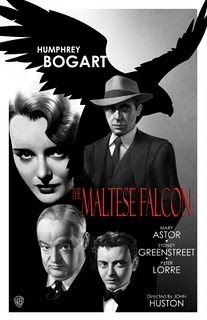 But to those who saw "The Maltese Falcon" when it was first released—or who read the Dashiell Hammett novel it was based on when it was published in 1930—every scene was a revelation. Sam Spade, Effie Perine, Wilmer, and Brigid O'Shaugnessy are stereotypes today, but Hammett and Huston were the artists who first gave them breath. "The Maltese Falcon"–both the movie and the novel—were works of astounding originality.
But to those who saw "The Maltese Falcon" when it was first released—or who read the Dashiell Hammett novel it was based on when it was published in 1930—every scene was a revelation. Sam Spade, Effie Perine, Wilmer, and Brigid O'Shaugnessy are stereotypes today, but Hammett and Huston were the artists who first gave them breath. "The Maltese Falcon"–both the movie and the novel—were works of astounding originality.
Before the "Maltese Falcon" appeared, there were two kinds of crime stories.
Most were puzzle mysteries in which murders were committed in drawing rooms and solved by clever detectives like Sherlock Holmes, who unmasked the guilty through unlikely deductive reasoning.
In them, the world was portrayed as a just and orderly place. When a crime intruded, it created a sense of menace and disorder. Then the detective arrived on the scene, solved the crime and restored the natural order of things. It was a Victorian world view, one of faith in progress and human decency.
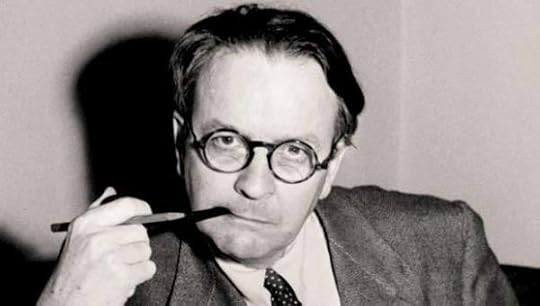
Raymond Chandler
When that faith was shattered by the carnage of World War I, a new kind of story was born. In it, Chandler explained, the world was a madhouse that had "created the machinery for its own destruction, and was learning to use it with all the moronic delight of a gangster trying out his first machine gun. The law was something to be manipulated for power and profit. The streets were dark with something more than night."
At first such tales were sordid and poorly written, appearing only in five-cent pulp magazines that men read in barbershops and hid from their wives and children. But with their mastery of style and storytelling, Hammett and Chandler lifted this new kind of story from the pulps and turned it into literature.
In doing so, Chandler said, they took the murders out of the drawing rooms and gave them back to the people who actually committed them.
Chandler's and Hammett's heroes, Philip Marlowe and Sam Spade, established the archetype on which nearly all private detectives who followed were based:
The detective's attitude toward authority. ("It's a long while," Spade said, "since I burst out crying because a policeman didn't like me.")
His invulnerability to the wiles of women. ("You're good. You're very good. It's chiefly in your eyes, I think, and that throb you get into your voice when you say things like, 'Be generous, Mr. Spade.'")
The detective's code of honor, essential to maintaining self-respect in a treacherous world. ("When a man's partner is killed, he's supposed to do something about it," Spade said. "It doesn't matter what you thought of him. He was your partner and you're supposed to do something about it.")
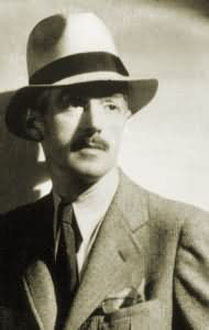
Dashiell Hammett
But by the late 1960s, many of us who revered Chandler and Hammett had grown aware of how dated all of this had become. Many wondered if a great contemporary hardboiled novel was even possible anymore. The knight errant with a pistol in his shoulder holster (Browning, not the poet but the automatic) had become an anachronism.
"Back then," says my crime writing buddy, Ace Atkins, "most people looked at it as a museum piece."
Lucky for us, however, Robert B. Parker and Gregory Mcdonald appeared on the scene in the 1970s and breathed new life into the genre—although Parker is the one who received most of the credit for it.
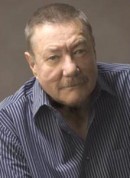
Robert B. Parker
The traditional hard-boiled detective had always been a loner. But Parker's hero, Spenser, was a modern man. He had close friends. He respected women and (some) cops. He had a long-lasting, monogamous relationship. He even cooked. Parker turned this hero loose not just on underworld murders but on modern problems including child abuse and schoolyard bullying.
Most importantly, Spenser faced the problem of the anachronistic knight-errant head on, turning his novels into an examination of the limits heroism in the modern world.
Mcdonald's two series characters, a non-conformist investigative reporter named Fletch and a quirky Boston police inspector named Flynn, addressed the problem differently.
Although Fletch was something of a loner, Flynn was a family man, something almost unheard of in the genre.
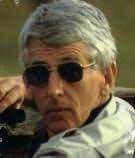
Gregory McDonald
"Neither of them could have existed before the 1960s," Mcdonald once told me. "In the great mystery novels of the '30s and '40s, the woman was either a Madonna or a doll. Neither Fletch nor Flynn has this regard for women. Women are their equals, their friends. Their regard for authority is also completely new and contemporary. They are not anti-authoritarian for the hell of it, nor do they give in to authority for any reason. They see it for what it is—something set up by humans that is fine only when it works."
If it weren't for Parker, Atkins says, "I wouldn't have a job now." But Mcdonald deserves some of the credit, too.
Still, it's going on 40 years since Parker and Mcdonald's characters burst on the scene, and now they can feel a bit dated, too. But today, a host of writers including Walter Mosley, Dennis Lehane, George Pelecanos and Robert Crais are following their lead, creating modern detective heroes for today's complicated world.
With the publication of my first novel, "Rogue Island," my series character, Liam Mulligan joined them. Like Fletch, he is an investigative reporter for a metropolitan newspaper. And like Fletch, he's got a smart mouth that often gets him into trouble.
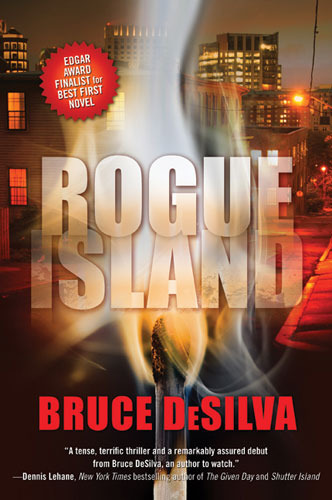 But newspapers were thriving in Fletch's day. The newspaper Mulligan is working for is dying, like most newspapers are now. He's never sure how long he's going to have a job, giving the plots an extra layer of tension and making them not only hardboiled stories but lyrical tributes to the fading business that he and I love.
But newspapers were thriving in Fletch's day. The newspaper Mulligan is working for is dying, like most newspapers are now. He's never sure how long he's going to have a job, giving the plots an extra layer of tension and making them not only hardboiled stories but lyrical tributes to the fading business that he and I love.
Mulligan is a 21st century man with complex, often troubled, relationships with the opposite sex. He's got a strong but shifting sense of justice that leaves him uncertain about the right thing to do in a world where neither movies nor problems appear in black and white.
And the cases he investigates involve not just murders but the larger issues of today's society. For example: the second novel, "Cliff Walk," which will be published next year, has a plot built around an unsolved murder, but it is also an examination of sex and religion in the age of pornography.
Does this work? Reviewers seem to think so; the notices for the first novel have all been raves. But ultimately, that's a question for readers to decide. Still. the comment I'm most proud of came from Joseph Finder, a New York Times best-selling thriller writer, who said this about my first book:
"Bruce DeSilva has done something remarkable: He takes everything we love about the classic hard-boiled detective novel and turns it into something that is fresh, contemporary, yet timeless."
Now I've got to get back to work to see if I can do it again.
This article first appeared on the wonderful "Mystery Fanfare" blog. You can find it here.








July 11, 2011
Look Who's Reading "Rogue Island"
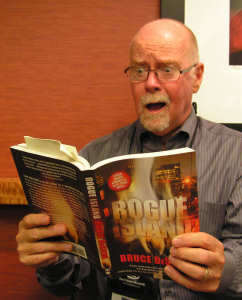 It's John Lescroart, the New York Times best-selling thriller writer, reading the new trade paperback edition of my Edgar Award-winning novel.
It's John Lescroart, the New York Times best-selling thriller writer, reading the new trade paperback edition of my Edgar Award-winning novel.
I met him at this year's Thrillerfest conference in Manhattan last week. He's a great guy.








July 3, 2011
Finding Your Storyteller's Voice: A Thrillerfest Workshop
 Thrillerfest, the great crime fiction conference, is in Manhattan this
Thrillerfest, the great crime fiction conference, is in Manhattan this  week, July 6-9, and I'm proud to be a part of it.
week, July 6-9, and I'm proud to be a part of it.
On opening day, Wednesday, I'll be conducting a 50-minute craft workshop titled "Finding Your Storyteller's Voice." Later, I'll be signing copies of my Edgar Award-winning crime novel, Rogue Island. Hope you can join me.
You can find details about the conference here.








July 1, 2011
Julia Spencer-Fleming Interviews Me About Crime Fiction
 Julia Spencer-Fleming, who won a truck-load of awards for her first three mysteries, interviewed me about my writing process, getting published and a bunch of other things for the Bouchercon international crime writers website.
Julia Spencer-Fleming, who won a truck-load of awards for her first three mysteries, interviewed me about my writing process, getting published and a bunch of other things for the Bouchercon international crime writers website.

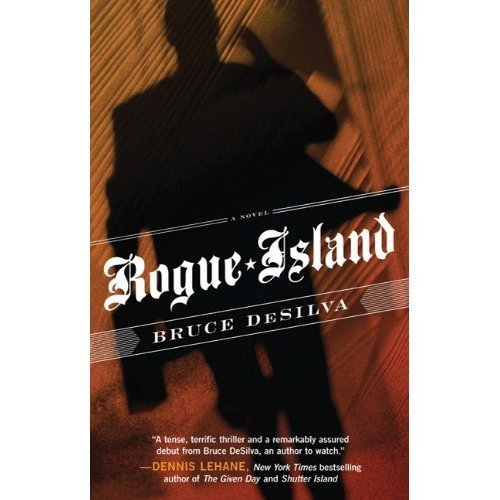 I'll be in St. Louis in September for the annual Bouchercon conference, where the Anthony, Macavity and Barry Awards for crime fiction will be announced. My novel, Rogue Island, which has already won the Edgar Award, is a finalist for all three.
I'll be in St. Louis in September for the annual Bouchercon conference, where the Anthony, Macavity and Barry Awards for crime fiction will be announced. My novel, Rogue Island, which has already won the Edgar Award, is a finalist for all three.
You can find the whole inerview here.








June 29, 2011
"Rogue Island" Named a Finalist for the Macavity Award

 Honors continue to pile up for my debut crime novel, Rogue Island.
Honors continue to pile up for my debut crime novel, Rogue Island.
Yesterday it was named a finalist for the Macavity Award in the best first novel category. The award, voted on by members of the Mystery Readers Journal, is named after the "mystery cat" in T.S. Eliot's Old Possum's Book of Practical Cats.
In April, the novel won the Mystery Writers of America's prestigious Edgar Award for best first novel; and it is also a finalist for the Anthony and Barry Awards. The Macavity, the Anthony and the Barry will all be presented at Bouchercon, the international mystery writers conference, in St. Louis this fall.
For a list of all the Macavity finalists, please click here.
Rogue Island is available in trade papeback, Kindle, hardcover and large print editions — although the hardcover is in rather short supply now. You can order any of those editions here.
It is also available as a downloadable audio book from Audible. That can be ordered here.








